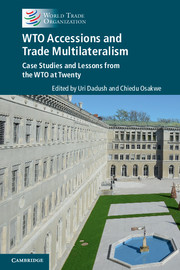Book contents
- Frontmatter
- Dedication
- Contents
- List of contributors
- Foreword
- Acknowledgements
- List of abbreviations
- Editors' note
- PART I WTO accessions, the trading system and the global economy
- PART II Overview: systemic outcomes from accessions
- PART III Members’ perspectives on accession negotiations
- Original members
- Article XII members
- 16 The 2001 WTO accession of China: negotiating experience – challenges, opportunities and post-accession approaches
- 17 The 2001 WTO accession of the Separate Customs Territory of Taiwan, Penghu, Kinmen and Matsu: negotiating experience – challenges, opportunities and approaches post-accession
- 18 The 2004 WTO accession of Cambodia: negotiating priorities and experience – growth and integration eleven years later
- 19 The 2008 WTO accession of Ukraine: negotiating experience – challenges, opportunities and post-accession approaches
- 20 The year 2012: WTO accession of Montenegro – why did we apply to join? Priorities and results
- 21 The 2012 WTO accession of Russia: negotiating experience – challenges, opportunities and post-accession approaches
- 22 The 2013 WTO accession of Lao PDR: specific commitments and the integration of least-developed countries into the global economy
- 23 The 2013 WTO accession of Tajikistan: experience of a landlocked economy in a changing regional economic configuration
- 24 The 2014 WTO accession of Yemen: accession negotiations as an instrument for domestic reform, national security and international cooperation
- PART IV Working party chairpersons’ perspectives on accession negotiations
- PART V Salient features inWTOAccession Protocols
- PART VI Conclusion
- Annex: Contributor biographies
- Index
- Plate section
21 - The 2012 WTO accession of Russia: negotiating experience – challenges, opportunities and post-accession approaches
from Article XII members
Published online by Cambridge University Press: 05 November 2015
- Frontmatter
- Dedication
- Contents
- List of contributors
- Foreword
- Acknowledgements
- List of abbreviations
- Editors' note
- PART I WTO accessions, the trading system and the global economy
- PART II Overview: systemic outcomes from accessions
- PART III Members’ perspectives on accession negotiations
- Original members
- Article XII members
- 16 The 2001 WTO accession of China: negotiating experience – challenges, opportunities and post-accession approaches
- 17 The 2001 WTO accession of the Separate Customs Territory of Taiwan, Penghu, Kinmen and Matsu: negotiating experience – challenges, opportunities and approaches post-accession
- 18 The 2004 WTO accession of Cambodia: negotiating priorities and experience – growth and integration eleven years later
- 19 The 2008 WTO accession of Ukraine: negotiating experience – challenges, opportunities and post-accession approaches
- 20 The year 2012: WTO accession of Montenegro – why did we apply to join? Priorities and results
- 21 The 2012 WTO accession of Russia: negotiating experience – challenges, opportunities and post-accession approaches
- 22 The 2013 WTO accession of Lao PDR: specific commitments and the integration of least-developed countries into the global economy
- 23 The 2013 WTO accession of Tajikistan: experience of a landlocked economy in a changing regional economic configuration
- 24 The 2014 WTO accession of Yemen: accession negotiations as an instrument for domestic reform, national security and international cooperation
- PART IV Working party chairpersons’ perspectives on accession negotiations
- PART V Salient features inWTOAccession Protocols
- PART VI Conclusion
- Annex: Contributor biographies
- Index
- Plate section
Summary
ABSTRACT
The working party on the accession of Russia was the biggest and longest in WTO accession history. A big power that decides to join an international organisation, even if this is the WTO, cannot avoid political burdens. No big country can stay apart from world politics. The WTO accession process is tough, demanding and complex, with no clear rules. This raises questions about length, fairness and lack of procedural clarity. Yet it is risky to stay outside the rules-based multilateral trading system. To navigate the WTO accession process, upfront, it is critical to define a negotiating strategy and plan the end-game well in advance – a process that requires mobilisation of all negotiating resources, concentration and focus. Domestically, the challenge for the acceding government is to state a clear rationale for accession, demonstrate that there will be real benefits from accession or at a minimum, that there will be no negative consequences, and define red lines to be defended. Negotiating positions should be aligned with requirements for domestic reform. Strong and consistent political will and leadership with support from the parliamentary majority are necessary to conclude any accession negotiations. WTO accession may, in itself, play neither a negative nor a positive role for domestic economic developments, but by becoming a member, a country will obtain benefits in the medium and long term, through the creation of better terms for its trade within the WTO itself. In this chapter, Russia's practical experience of its accession negotiation, the obstacles encountered, its assessment of the benefits of accession, including lessons learned during the process, are described.
Getting started
Arranging the working party: a group of supporters rather than a line of customers?
An accession working party is established by the WTO General Council, but this decision does not identify its participants.
Any member may join the working party at any time of the accession process. This is important to know, since there could be situations where a member joins the working party at the last minute – for example, if its own accession has been just completed – and asks to enter market access negotiations when you are close to completing your own process. Be aware of such situations. Look around at any important stage of your accession and speak with those who can potentially enter the game at the last minute.
- Type
- Chapter
- Information
- WTO Accessions and Trade MultilateralismCase Studies and Lessons from the WTO at Twenty, pp. 528 - 544Publisher: Cambridge University PressPrint publication year: 2015



